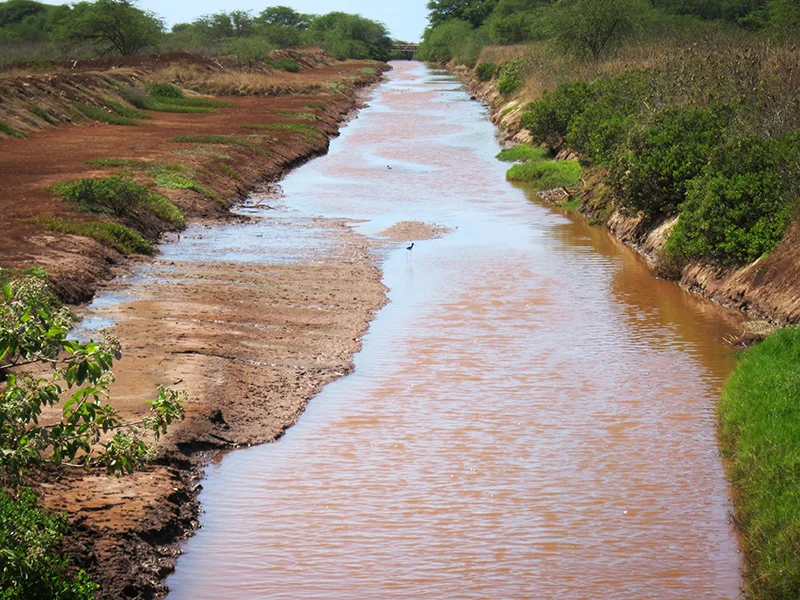
A June 13th federal court ruling gave the Surfrider Foundation another important legal victory to protect clean water in Kaua’i under the Clean Water Act. United States District Court for the District of Hawaii Judge Derrick K. Watson held that Hawaii Department of Health must provide a National Pollutant Discharge Elimination System (“NPDES”) permit for discharges into Kīkīaola Harbor. Nā Kia‘i Kai and Surfrider Foundation, represented by Earthjustice, filed a federal lawsuit against the County of Kauaʻi and director of the Hawai‘i Department of Health (“DOH”) in June 2022 for their failure to regulate discharged polluted water into Kīkīaola Harbor and the nearby ocean. This is the latest in a series of victories that these groups have secured to protect important surf breaks, subsistence fishing grounds, and other recreational areas along West Kauaʻi from contamination that muddies the water, suffocates the reef, and puts the health of ocean users at risk.
The Kīkīaola Harbor Drain System consists of ditches, which the Clean Water Act expressly defines as a type of point source pollutant regulated by the law. DOH argues that because there are nonpoint sources within the Mana Plain that the entire Plain should be subject to Nonpoint Source regulations. The court found this unpersuasive and no reason “to ignore the plain language of the CWA.” This ruling logically follows a 2019 victory for our coalition where this District Court ruled that discharging pollution into the ocean from the Mānā Plain's ditch system, including from the Kīkīaola Harbor Drain, requires a federal permit under the Clean Water Act.
The County of Kaua’i recently decided not to oppose the environmental and community groups in the Motion for Summary Judgment to enforce Clean Water Act safeguards from pollutant discharges from the Kīkīaola Harbor Drain. However, the Hawai'i Department of Health, which is responsible for issuing NPDES permits in Hawai‘i, refused to process the application and responded that no permit was required, contradicting the court’s 2019 order.
The potential pollutants in this water system are significant and in need of regulation. As the ruling points out, the waters discharged from the Kīkīaola Harbor Drain System contain enterococci, an indicator of human and animal waste, which enter the ditch via stormwater runoff from the surrounding land, including the Waimea Wastewater Treatment Plant. These waters also contain TPH-diesel, oil, and grease, which enter via stormwater runoff from the surrounding land, including a gravel and asphalt plant. And the discharged waters may be impaired by nutrient loads, including nitrogen and phosphorous.
“Pollution from drainage ditches along the Mānā Plain is putting our health at risk,” said Dr. Carl Berg, Kauaʻi resident and Senior Scientist for Surfrider Foundation, Kauaʻi Chapter. “It’s time for the Department of Health to step up and regulate instead of continuing to fight us in court.”
